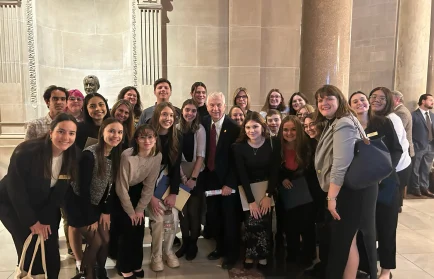Resources For Faculty and Staff
Partnering with Faculty and Staff to Support Student Well-Being
As a faculty or staff member, you have the opportunity to work closely with students, and you may encounter distressed students in your classrooms or offices. Your role can be a positive and crucial one in identifying students who are in distress and assisting them to get the help they may need. In doing so, we hope that the following information and resources are helpful to you.
While most students cope successfully with demands of college life, for some, the pressures can become overwhelming and unmanageable. If you observe some of the following, we encourage you to talk to your student about what may be going on for him/her and possibly about receiving help from us. While this list is not intended to be exhaustive, we hope that it provides you with some information regarding “warning signs.”
- Increased tardiness or absences
- Incomplete assignments
- Diminished motivation or concentration
- Poor personal hygiene
- Noticeable weight loss
- Significantly low and/or elevated mood
- Appearing fatigued, lethargic, or extremely sad
- Irritable, argumentative, or disruptive behavior
- Very rapid speech, or heightened activity and restlessness
- Excessively anxious, worried, or stressed
- Suspected alcohol or other substance abuse
- Bizarre behavior or speech
When reaching out to your student, here are some suggestions that might make the situation more comfortable for you and helpful for your student:
- Talk to your student in private when both of you have time and are not rushed or preoccupied.
- Describe the things you have observed that concern you.
- Listen to your student. Communicate understanding by restating what you heard him/her say.
- Avoid judging, evaluating, and criticizing. Simply listen and offer support.
- Remind your student that he/she is not alone. Work with him/her to identify options additional sources of support (i.e., family, friends, clergy, coach).
- Talk to your student about seeking counseling services by referring them to us.
- Follow up with your student. Check in with him/her to ensure that help has been received.
For information about how to refer students to us, please navigate to the “Referrals & Consultation” accordion tabs below.
Referrals & Consultation
To help your student receive help from us, you may encourage him/her to schedule an appointment by phone or in person. You may choose to have your student call us while he/she is with you in your office, or you may accompany your student to schedule in person. We generally find that students are receptive to your suggestions, particularly given that you have indicated that you care about them by noticing their distress.
If your student is reluctant to make an appointment with us, we encourage you to continue to be supportive, allow for some time to pass, and then bring it up again if you are still observing signs of distress. You may also contact us for a consultation, and we can offer you support and possibly other strategies for encouraging your student to seek help.
If you are concerned about the immediate safety regarding your student (e.g., threatened or attempted suicide) or you believe that your student is of immediate threat to you or others, please call 911 for help.
If you would like some additional help in assisting your student or would like to provide information to us regarding a student of concern, please do not hesitate to contact us. Our professional staff can be available to you for consultation by calling our office at 219.464.5002 and asking to speak to a therapist. If a therapist is not available at the moment, we will take your information and the next available therapist will contact you. We are happy to offer you support and suggestions to you as you try to help your student get the help they may need. We find that as a faculty or staff member, you are often one of the first individuals to know about your student’s distress, as you may be in frequent contact with him/her.
We certainly understand that you may be concerned about your student and want to know whether he/she has followed through with your referral to us. While we are glad to offer assistance to you, and to take any information you may have, we are required by law to maintain confidentiality of the student. This means that we cannot share any information with you, including whether your student has scheduled or attended an appointment with us, unless he/she has provided written permission for us to do so.
For more information regarding our confidentiality policy, please go here and navigate to the confidentiality section of our FAQs.
Stress Periods for Students
We recognize that college can be a stressful experience for students. The following describes some typical sources of stress for each month of the academic year. Awareness of some of the common stress patterns may help you to provide some support and to assist students in working through these periods. We encourage you to refer students to us if you believe that their stress is significantly interfering with their overall functioning.
The following is adapted from NASPA Journal, Larson & Laramee.
Can be stressful for first-year students in particular.
Returning students may be struggling with new status (e.g., sophomore, junior, senior) at university and the accompanying responsibilities.
Homesickness may be strong as students struggle with making new friends and feeling a sense of “ownership” in the university; may feel alienated from others and/or experience discrimination.
New students may also struggle with newfound freedom — specifically; they may find it difficult to develop a structured lifestyle that will help them meet academic demands.
Some students may experience a discrepancy between high school status and grades and initial college performance. This might lead to feelings of frustration if student’s performance is below expectations.
Students begin to realize that life at college is not as perfect as they were led to believe by parents, teachers, and admissions staff.
Non-dating students may sense a loss of esteem because so much value is placed upon dates.
Some may feel lonely because they have been unsuccessful at developing supportive friendships.
Job panic for mid-year graduates may hit.
Students may begin to feel overwhelmed by all of the academic demands.
Increased academic pressure may be experienced due to procrastination, difficulty of work, and/or lack of sufficient ability.
Some students may not be able to go home for the holidays, which could contribute to feelings of isolation and homesickness.
Feelings of sadness and worry may increase because of beliefs that one should have adjusted to the college environment by now.
Economic concerns may emerge as funds from parents and summer earnings begin to run out.
Some students are still struggling with making friends and may be tempted to give up; social isolation may also be negatively affecting their ability to study.
Extracurricular time strain — Seasonal parties, concerts, social service projects, and religious activities drain students’ energy.
Students may have concerns about losing some or all of the recently acquired freedom/independence while at home for winter break.
Worry may increase as final examinations approach and papers are due.
Pre-holiday feelings of sadness may increase especially for those who have concerns for family, those who have no home to visit, and for those who prefer not to go home because of family conflicts.
Financial strain because of holiday gifts and travel costs may be concerns for some.
Sadness over loss of security and familiarity as students leave home and return to school.
Seniors may feel sad about impending loss of college student identity and changes in friendship that will occur with graduating in May.
Some apprehension about academic performance this semester if the first semester was more challenging than expected. Some students may also feel ashamed of their academic performance from the previous semester.
Students may learn that some friends are not returning to school. As a result, students may feel sad at the loss of those relationships.
Students may also find that they do not like the classes they registered for and/or need to register for different classes due to last semester’s performance. Students may experience frustration at trying to establish desired class schedule.
Many students experience optimism because the second semester is perceived as easier than the first semester.
Students begin to feel the pressure of midterms as spring break quickly approaches.
Some seniors may begin to feel worry when they realize that they do not want a job in the field in which they majored.
Couples may begin to establish stronger ties or experience weakening of established ones.
Students who have failed to establish social relationships or achieve a moderate amount of recognition may feel very frustrated and dissatisfied with their college experience.
Talk of spring break plans tends to dominate students’ conversations.
Students may also worry because they have yet to find a summer job.
Returning from spring break, students realize that there are about six weeks left in the semester. As a result, academic pressure may increase.
Many seniors experience an existential crisis. Must I leave school? Is my education worth anything? Was my major a mistake? Why go on? Where is God? Will I make it?
Seniors who have not looked for a job or who have not been able to find a job typically begin to worry about life after college.
Academic pressure continues to increase because of impending final exams.
Seniors who have not received a job offer may feel anxious—especially when they learn that their peers are getting job offers.
Sophomores, as they register for fall classes, are realizing that they will be taking classes in their major next semester. Some may worry about their abilities to meet the academic requirements of their chosen major.
Summer job pressure continues. Students may experience worry while waiting to hear from companies.
Students may experience some worry over choosing a major.
Pressure of planning for graduation increases, as invitations need to be sent out and celebratory plans confirmed.
Final exams, papers, and projects may feel overwhelming.
Social pressures can increase as everybody is bidding for your participation on trips and at graduation parties.
Concern develops because of the realization that the school year is ending.
Panic over not having any confirmed plans for the summer may be large.
Seniors may be concerned about transition to new phase of life (job, graduate school, marriage, etc.).
Students may experience sadness, frustration, and anger over leaving friends and facing conflicts at home.
Pressure of passing final exams peaks.
Explore More
Contact us
Get in touch with our Counseling Center located at Alumni Hall (North side of building).
Fax: 219.464.6865
Counseling Center
219.464.5002
counseling.center@valpo.edu
1602 LaPorte Ave.
Valparaiso, IN 46383
Counseling Center (CC)







